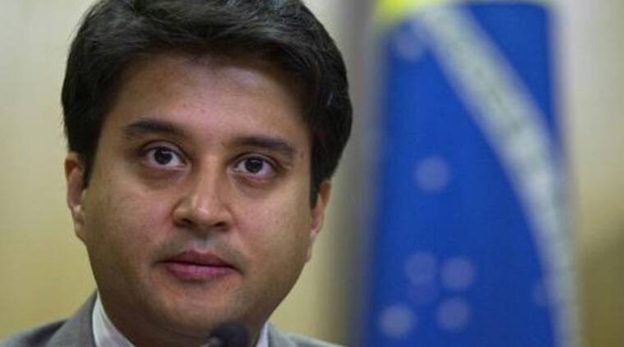Emphasising that the Indian aviation is just entering the growth phase, Union civil aviation minister Jyotiraditya Scindia has said the time is ripe for participation in the largest possible manner in the sector and hoped that the number of fliers will touch 100 million this year. Scindia, who arrived here on the first leg of […]
Emphasising that the Indian aviation is just entering the growth phase, Union civil aviation minister Jyotiraditya Scindia has said the time is ripe for participation in the largest possible manner in the sector and hoped that the number of fliers will touch 100 million this year. Scindia, who arrived here on the first leg of his visit to North America, also said that capacity building at airports is underway to ensure that there are no bottlenecks in the coming years. After remaining suspended for two years due to the coronavirus pandemic, scheduled international flights to and from India resumed on March 27, with 100 per cent capacity.
As on date, there were close to about 3,500 flights between Indian and foreign carriers into India, the minister said.”For a country of 1.3 billion people, the fact that you have 144 million passengers, means that your penetration level even now is only 8 per cent. So that tells you the potential in the years to come,” he said.
Responding to a question by PTI during an interactive session held at the Consulate General of India in New York on Thursday, Scindia said, “I think the time is ripe for participation in probably the largest possible manner in the area of civil aviation and I think all international airlines can sense the opportunity and potential” in India.
The minister began his engagements with discussions with New York-based technology-powered, global air mobility platform Blade. Later in the day, he interacted with members of the Indian diaspora during a session and reception hosted by Consul General of New York Randhir Jaiswal. During the interactive session, Scindia outlined the growth plans for India’s civil aviation industry and also spoke about the safe evacuation of nearly 22,000 students from Ukraine through ‘Operation Ganga’, following Russia’s invasion of the country.
“We had 144 million fliers in India, pre-COVID in the years 2018-19. And our closest competition is the first and second AC of the Indian railways.”I’m looking at a number of close to closing this year at about 100 million, up from about 50 million in COVID years. And I see us reaching almost about 400 million by 2030. So, that’s the potential we are looking at,” Scindia said.
Noting that capacity building at India’s airports is underway to ensure there is no bottleneck in the next two-three years, Scindia said, “I look at a huge participation of the airline majors not only in terms of flights coming in but also in terms of building our airports” and cited the example of Zurich airport developing the Noida International airport in Jewar, around 70 kilometres from New Delhi.
He said more and more of such collaboration will happen in the years to come, along with capacity building by India’s domestic players themselves.”So I see this sector growing tremendously and also all the analogous sectors of the ecosystem, including manufacturing for aircrafts in India,” Scindia said, adding that the thrust is not only on the 777s, and 787 Dreamliners but also on last-mile connectivity.
Citing the regional air connectivity scheme UDAN (Ude Desh ka Aam Naagrik), he said that Prime Minister Modi has done the greatest service to transportation in India by democratising civil aviation.All the majors in aviation, including Boeing, Airbus, Lockheed Martin, are now manufacturing in the country and the fuselage of the Apache helicopters are made in India. There is a tremendous amount of manufacturing happening in India, he highlighted.
According to him, the Indian aviation sector was in its nascency for a long period of time.Referring to an economic paradigm, he said every industry goes through an ‘S’ shaped curve, where the bottom half of the ‘S’ is when the industry is in its nascency, the middle part of the ‘S’ is when the industry is in the growth phase and the top part of the ‘S’ is when the industry is attaining maturing.
“Indian aviation is between the nascency phase and the growth phase, just entering the growth phase. So no pun intended but the sky is the limit,” the minister said. Stressing the importance of green energy, Scindia said he was looking at Sustainable Aviation Fuel as a substitute for Air Turbine Fuel as well as at the ambitious target of becoming net zero by 2070 and adding 500 GW of renewable energy by 2030.
“Our outlook is not an outlook for India alone. It’s an outlook for the region. It’s an outlook for the world,” in line with the concept of Vasudhaiva Kutumbakam, he said. and pointed out that it was important to be looking at tackling emissions of airplanes.”Civil aviation as a sector globally only composes hardly 2 per cent of global CO2 emissions. But nevertheless, we need to act responsibly as a sector and therefore, within civil aviation, we’re looking at sustainable aviation fuel as a substitute for ATF,” he added.
In this regard, he said the two main hurdles of storage and logistics are being addressed.It has also been decided that by 2024 end, about 96 airports of the Airports Authority of India (AAI) would operate on 100 per cent renewable energy. Also in the works is a carbon mapping exercise for airports and building a green plan going forward, Scindia said.
On India-US ties, Scindia said he believes that bilateral relations have taken extremely deep roots, especially in the last seven-eight years. “It has turned into a very comprehensive, strategic relationship” under the Modi government.
https://www.financialexpress.com/infrastructure/airlines-aviation/indian-aviation-in-growth-phase-time-ripe-for-participation-in-largest-possible-manner-scindia/2507859/





